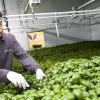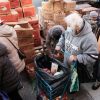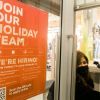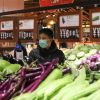-
 +12 +4
+12 +4Why hasn’t the United States seen Hyperinflation?
For those of you who aren’t familiar, CPI is the most common measure of inflation. CPI measures the cost of a set basket of goods over time. This includes things like food, gas, and rent. While CPI is a terrible measure of inflation, that’s for another day. As of December, CPI increased 7%. That’s the fastest increase in 40 years. This jump was caused by both supply shortages and massive creation of money.
-
 +14 +3
+14 +3A huge study of 20 years of global wealth demolishes the myth of 'trickle-down' and shows the rich are taking most of the gains for themselves
The globe's richest people own far more wealth than the bottom half — including Elon Musk, the world's richest man.Picture Alliance/Getty Images
-
 +14 +2
+14 +2U.S. inflation rate swells to 39-year high of 6.8% as Americans pay higher prices for almost everything
The numbers: The cost of living climbed again in November and drove the rate of U.S. inflation to a nearly 40-year of 6.8%, putting more pressure on households as they confront rising prices of gas, food, cars, rent and so forth.
-
 +19 +4
+19 +4China Evergrande finally defaults. Now what?
Instead of resolving questions about the fate of the Chinese behemoth, the announcement that it has defaulted has only deepened them.
-
 +13 +2
+13 +2We'll all be paying a lot more for food next year, says Canada's Food Price Report
Sky high food prices were one of many negative impacts that Canadians felt during the pandemic plagued year of 2021. And a new report suggests that problem is only going to get worse next year.
-
 +23 +3
+23 +3The number of U.S. workers quitting their jobs in September was the highest on record.
Employers are still struggling to fill millions of open jobs — and to hold on to the workers they already have. More than 4.4 million workers quit their jobs voluntarily in September, the Labor Department said Friday. That was up from 4.3 million in August and was the most in the two decades the government has been keeping track. Nearly a million quit their jobs in the leisure and hospitality industry alone, reflecting the steep competition for workers there as businesses recover from last year’s pandemic-induced shutdowns.
-
 +27 +7
+27 +7China has a big inflation problem and it's pushing up prices worldwide
China's inflation headache is getting worse.
-
 +20 +3
+20 +3Uber is looking at dispatching New York's yellow cabs from its app amid a driver shortage
Uber app users could see New York City's yellow cabs as another option alongside "UberX," which would be facilitated through TLC's "E-Hail" program.
-
 +18 +4
+18 +4It’s clear capitalism isn’t working when US politicians try to bring back child labor
There is something very, very wrong with a system that would rather recruit more kids instead of paying better wages and providing more benefits to adults
-
 +21 +2
+21 +2Costco raised its minimum wage to $17 an hour
Costco this week raised its starting wage for hourly store workers in the United States for the second time this year as businesses hike pay to draw and retain workers amid a labor shortage. Costco (COST) told employees last week that it would increase its minimum wage from $16 an hour to $17 starting on Monday. Costco has around 180,000 US employees, and 90% of them work hourly.
-
 +20 +3
+20 +3The Strange New Trend That’s Enraging Hiring Managers
My, how the tables have turned.
-
 +4 +1
+4 +1Analysis: Large pharma companies do little new drug innovation
Among their top-selling drugs, 76% of Pfizer's and 89% of J&J's were developed by other companies and account for nearly 90% of revenues.
-
 +2 +1
+2 +1Unilever warns of more price hikes as inflation worsens
Unilever warned inflation was likely to accelerate next year and its prices would have to rise further as consumer goods companies battle to offset surging energy and other costs.
-
 +14 +2
+14 +2Oil prices climb as COVID recovery, power generators stoke demand
Oil prices hit multi-year highs on Monday buoyed by recovering demand and high natural gas and coal prices encouraging users to switch to fuel oil and diesel for power generation.
-
 +17 +4
+17 +4Why American workers are quitting in record numbers
The number of Americans quitting their jobs has hit record highs over the past several months in a phenomenon economists have been calling the “Great Resignation.” In August, 4.3 million U.S. workers — almost 3 percent of the entire American workforce — voluntarily left their positions, the highest number since the Bureau of Labor Statistics began tracking “quits” in 2020.
-
 +15 +2
+15 +2Baby boomers are snatching houses out of the hands of millennials
Baby boomers and millennials are in a housing war. A Zillow report lays out how boomers are winning, and it's really not even close.
-
 +28 +3
+28 +3How Much E-waste are We Making?
A group of researchers across the UNU, UNITAR, ITU, and ISWA[0] recently released The Global E-waste Monitor 2020 report, giving us an up to date look at just how much electronic waste we’re generating around the world. The numbers are worrying. We’ve gone from 44.4 million metric tons per year in 2014 to 53.6 million metric tons in 2019.
-
 +16 +1
+16 +1A Record Number of Americans Are Quitting Their Jobs; Highest Numbers Since 2000 - Media Traffic
A record 4.3 million people quit their jobs in August, evidence of the considerable leverage workers have in today’s economy. About 2.9% of the workforce quit in August, up from 2.7% in July, according to the Job Openings and Labor Turnover Survey (JOLTS) report, released Tuesday. That marks the highest quit rate since the report began in late 2000.
-
 +14 +2
+14 +23 US-based economists win Nobel for research on wages, jobs
A U.S.-based economist won the Nobel prize in economics Monday for pioneering research that transformed widely held ideas about the labor force, showing how an increase in the minimum wage doesn’t hinder hiring and immigrants do not lower pay for native-born workers. Two others shared the award for creating a way to study these types of societal issues.
-
 +17 +1
+17 +1Smaller packs, same price: curse of ‘shrinkflation’ hits shoppers’ baskets
Shoppers should watch out for supermarkets and food brands sneaking through price rises by shrinking pack sizes – known as “shrinkflation” – as they wrestle with rising commodity, energy and labour costs, analysts have warned.
Submit a link
Start a discussion




















